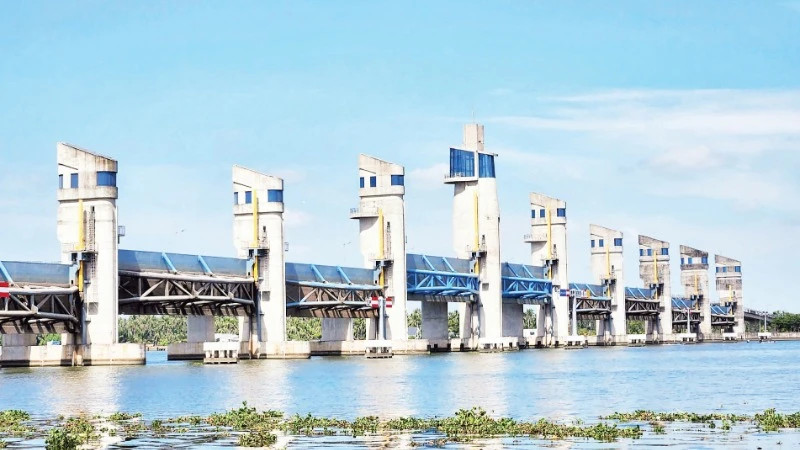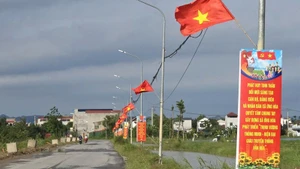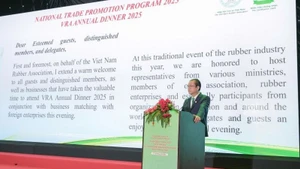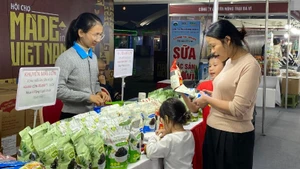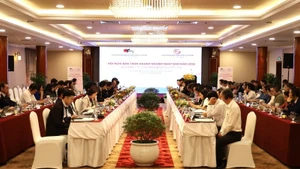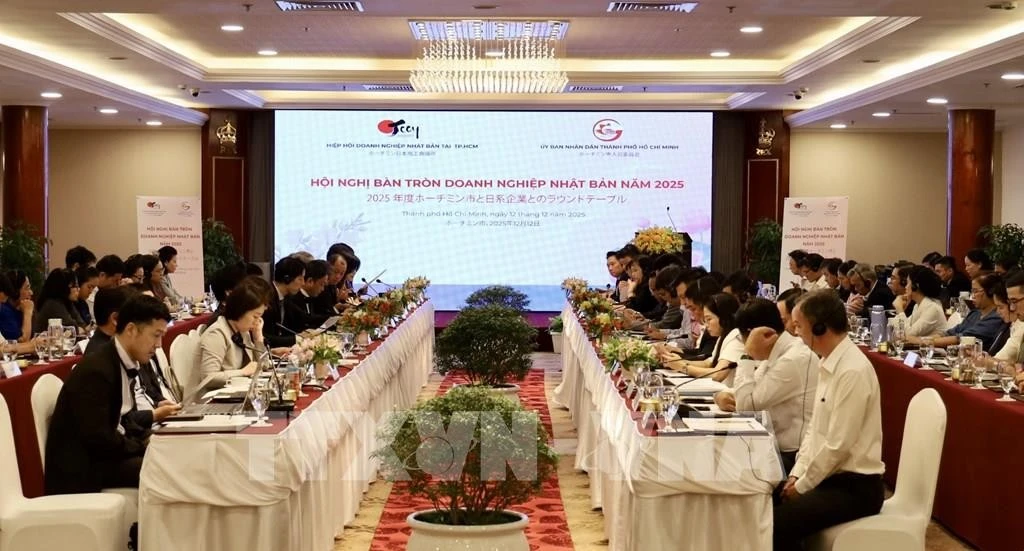According to a report by the Ministry of Agriculture and Environment, in the first two months of 2025, the Mekong Delta experienced unseasonal rains. Localities have proactively operated irrigation systems to store water in the system when salinity increased, so salinity intrusion has not and will not cause damage to agricultural production, and will not affect water sources for people’s lives.
However, by the end of March, the Mekong Delta still had some salinity intrusions. After nearly 3 years of operation, the Cai Lon-Cai Be irrigation system in Kien Giang province has flexibly closed the sluice gates to control high tides and reduce flooding in the upstream; at the same time, taking brackish water alternately to serve the people’s production well.
Lam Van Thoi from Dong Tranh hamlet, Vinh Binh Bac commune, Vinh Thuan district, Kien Giang province said that for more than 2 years now, he has been taking brackish water into a nearly 2ha field to raise giant freshwater prawns smoothly. From April to June every year, a part of Cai Lon sluice is closed, preventing high salinity water, ensuring that people can take brackish water to raise shrimp.
In addition to raising shrimp, regulating water like this also helps Thoi and many farmers here grow 1 rice crop on shrimp land effectively. Also benefiting from the Cai Lon-Cai Be irrigation system, Dang Van Phung from Dong Yen commune, An Bien district, Kien Giang province said that for the past 2 years, he has no longer worried about salinity intruding into his fields, especially during the winter-spring rice crop.
“Currently, my land can safely grow two rice crops a year, unlike previous years, when the rainy season ended early, I was worried about saltwater entering the fields and causing the rice grains to be flat,” said Phung.
Although this year’s saltwater intrusion is not considered as high as in 2024, it is still a year with higher salinity than the average of many years. The Ministry of Agriculture and Environment has directed localities to increase water intake and storage of fresh water in canals, ditches, ponds, lakes, and low-lying areas; install and operate field pumping stations to maximise water resources, reduce water loss and waste.
In the long term, the Ministry will continue to research and build irrigation works to prevent saltwater intrusion, and complete irrigation systems that have been put into use to effectively control saltwater intrusion, such as the works to control the estuaries of Vam Co, Ham Luong, and the remaining estuaries.
The Ministry will also focus on upgrading and completing large irrigation systems such as Nhat Tao-Tan Tru, Bao Dinh, Go Cong, Bac Ben Tre, Nam Ben Tre, Nam Mang Thit, Quan Lo Phung Hiep, O Mon-Xa No; connecting and transferring water between irrigation systems to increase water storage capacity, transfer water within the region, transfer water between regions and proactively control and regulate water for agricultural, industrial and domestic production.
Learning from previous years, people in Phong Phu hamlet, Phong Nam commune, Giong Trom district, Ben Tre province have proactively produced early winter-spring rice to avoid salinity and store fresh water for daily life and production. Pham Thi Nhut Linh’s family has stored fresh water since the end of the rainy season, so they no longer worry about the lack of fresh water during the dry season as before. Not only Linh’s family, most people in Ben Tre province proactively store fresh water for production and daily life.
Irrigation works have been closed nearly 93% of the area to prevent salinity, store fresh water for people to grow seedlings and fruit trees.
Since 2016, Ben Tre Provincial Party Committee has launched a movement to store rainwater and fresh water during the drought and salinity season. Up to now, nearly 99% of households have sufficient conditions and tools to store rainwater and fresh water.
In some localities specialising in growing fruit trees, seedlings, and ornamental flowers in Cho Lach, Chau Thanh, and Mo Cay Bac districts, people have proactively implemented many water storage models with high efficiency such as digging ponds, spreading tarps to store water, utilising garden ditches to store water, building temporary dams and temporary sluices to store water, etc.
In addition, people have proactively equipped themselves with salinity measuring tools, regularly checked salinity, and shared information through social networks to proactively prevent salinity intrusion. Deputy Head of the Department of Agriculture and Environment of Cho Lach District, Tran Huu Nghi, said this year, the locality has proactively implemented plans to operate works and non-works to respond.
Currently, irrigation works have closed nearly 93% of the area to prevent salinity and store fresh water for people to grow seedlings and fruit trees. In addition, the agricultural sector also guides people to change crop structure, use technical solutions for water-saving production and proactively store fresh water in ponds, garden ditches, water bags, etc. during the drought and salinity season. In addition to storing fresh water, Ben Tre province is interested in and investing in solutions to build sluices and irrigation works to prevent salinity.
According to Director of the Department of Agriculture and Environment of Ben Tre province Doan Van Danh, up to now, the locality has invested in and completed construction of works in the northern area of Ben Tre such as: Tan Phu sluice, Ben Ro sluice; the dyke system along Tien river, Ham Luong river; Trung Nhuan sluice, Xeo Ran sluice; Kenh Lap reservoir; temporary dam works... to prevent salinity and store fresh water
The southern area of Ben Tre such as: Sa Ke sluice, Tang Du sluice, Kenh Lo sluice, Tan Huong sluice, the dyke system along Ham Luong river, the dyke along Co Chien river... have also coordinated to exploit and operate irrigation works flexibly and effectively, contributing to the formation of “pockets” of fresh water storage in the province.
